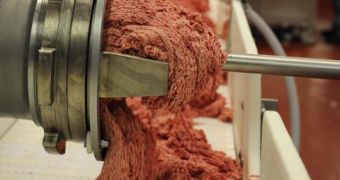Heads are starting to roll in the recent pink slime controversy. After several campaigns brought to parents' attention the fact that it was used in meat served to kids in schools, meat factories are seeing a downturn in revenue.
AFA Foods Inc. is just one of the many affected and it too blames the fake “controversy” for its sagging business, the LA Times reports.
The meat manufacturer has filed for bankruptcy, saying that the public outcry over the fat-free meat filler, based on no solid evidence, has run it out of business.
“The Pennsylvania company is blaming the recent coverage of ammonia-treated boneless lean beef trimmings – variously mocked as 'pink slime' or 'Soylent Pink' – for its dire financial straits,” the publication reports.
“The business, which is owned by billionaire Ron Burkle’s Yucaipa Cos., said it will shut down operations at its California factory while continuing to produce ground beef elsewhere,” adds LA Times.
AFA Foods isn't the only company to be on the verge of going belly up as the controversy continues to rage on.
“Beef Products Inc. shut down production at three of its four plants. Tyson Foods Inc., the largest protein producer in the country, said demand for all ground beef products will likely slump,” the aforementioned media outlet says.
This comes just a couple of weeks after BPI took a public stand on the debate, issuing a statement to say that the mixture was safe for children and blaming the media for leading parents to believe otherwise.
Pink slime is “lean finely textured beef,” or LFTB, and is described by health campaigners (with celebrity chef Jamie Oliver among the most vocal) as the kind of stuff you'd never put into your kid's mouth if you knew what it's made of – or how.
It's actually trimmings that wouldn't be otherwise used (Oliver says they would be either thrown out or used for dog food), treated with ammonium hydroxide to kill bacteria – and then ground into a paste.
The USDA has always considered pink slime to be safe for human consumption, which explains how it managed to stick around for years without people complaining about it.
Recent months saw a strange twist of events, with more and more concerned parents clamoring to have it banned in schools.

 14 DAY TRIAL //
14 DAY TRIAL //